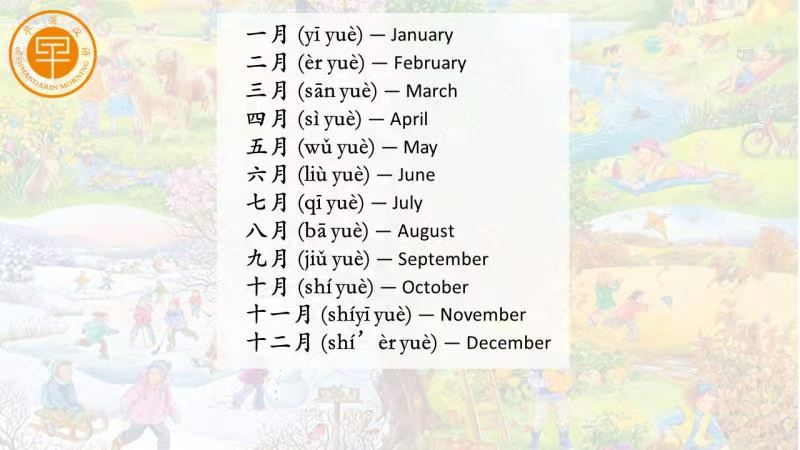| If you’re a beginner in Chinese, there’s every chance that you’ve already learned how to say the months in Mandarin. It’s really simple. But how much do you know about the celebrations during each calendar month?  The Calendar Months in Chinese: 一月 (yī yuè) — January Although the big celebration in China is Lunar New Year, the Chinese government recognizes January 1 as a public holiday. January 1: 新年 (xīnnián) — New Year’s Day 二月 (èr yuè) — February Depending on the lunar calendar, the date for Chinese New Year can vary between the end of January to mid-February. For 2021, all lunar New Year-related celebrations will fall in February. While the official dates for the Spring Festival are over after a week, celebrations usually continue for another week, ultimately ending with the Lantern Festival. February 11: 除夕 (chúxì) — Lunar New Year’s Eve February 12: 元旦 (yuándàn) — Lunar New Year’s Day February 11-17: 春节 (chūnjié) — Spring Festival, Chinese New Year February 26 (Lunar Month 1 Day 15): 元宵节 (yuánxiāo jié) — Lantern Festival 三月 (sān yuè) — March March marks the first month of spring in China. 四月 (sì yuè) — April The next public holiday after Chinese New Year is the Qingming Festival, where people pay their respects to their deceased ancestors. April 4: 清明节 (qīng míng jié) — Qingming Festival, or Tomb Sweeping Day 五月 (wǔ yuè) — May The two most notable dates in May include Labor Day and the fairly recent addition of Chinese Internet Valentine’s Day. The numbers 5.20 in Mandarin is a homophone of 我爱你 (wǒ ài nǐ), meaning “I love you” in Chinese. May 1: 劳动节 (láodòng jié) — Labor Day May 20: 五二零 (wǔ èr líng) — 5.20, or Chinese Internet Valentine’s Day 六月 (liù yuè) — June June marks the beginning of summer in China. The main holiday of the month is the Dragon Boat Festival, which is also sometimes referred to as Poet’s Day. June 1: 六一儿童节 (liùyī értóng jié) — (6.1) Children’s Day June 14 (Lunar Month 5 Day 5): 端午节 (duān wǔ jié) — Dragon Boat Festival June 21: 夏至 (xiàzhì) — Xiazhi Festival, Summer Solstice 七月 (qī yuè) — July Early July is the start of the summer holidays for schools. 八月 (bā yuè) — August August is full of observed holidays. For Army Day, soldiers usually get a half day off. Although they do recognize International Fathers’ Day, China does have a day of their own. Because the date, 8.8 or 八八 (bābā), which is a homophone of 爸爸 (bà bà), meaning “dad,” August 8 seemed like an appropriate date to celebrate all the fathers out there. Other notable days include Chinese Valentine’s Day, as well as the Ghost Festival, the day that spirits are said to roam the Earth. August 1: 建军节 (jiàn jūn jié) — People’s Liberation Army Day August 8: 父亲节 (fù qīn jié) — Chinese Fathers’ Day August 14 (Lunar Month 7 Day 7): 七夕节 (qīxì jié) — Qixi Festival, Double Seventh Festival, Chinese Valentine’s Day August 22 (Lunar Month 7 Day 15): 中元节 (zhōng yuán jié) — Zhongyuan Festival, Ghost Festival 九月 (jiǔ yuè) — September September marks the beginning of fall in China. All schools resume classes by early September. The big holiday of the month is the Mid-Autumn Festival, which is sometimes referred to as the Mooncake Festival. September 11 (Lunar Month 8 Day 15): 中秋节 (zhōngqiū jié) — Mid-Autumn Festival 十月 (shí yuè) — October The second biggest holiday in China is National Day, which marks the beginning of the Golden Week. Another holiday in October is the Double Ninth Festival, an ancient holiday that involved drinking chrysanthemum wine and climbing mountains or towers. October 1: 国庆日 (guóqìng rì) — National Day October 1-7: 黄金周 (huángjīn zhōu) — Golden Week October 14 (Lunar Month 9 Day 9): 重阳节 (chóngyáng jié) — Chongyang Festival, Double Ninth Festival 十一月 (shíyī yuè) — November With the number 11 resembling bare sticks, 11.11 first came about as an anti-Valentine’s Day, which began in Nanjing University back in the ’90s. It has since grown to be the biggest online shopping event in the country and beyond. November 11: 光棍节 (guānggùn jié) — Double 11, Singles’ Day, Bachelors’ Day 十二月 (shí’èr yuè) — December December marks the beginning of the winter season in China, with the 21st being the winter solstice. December 21 (Lunar Month 11 Day 15): 冬至 (dōngzhì) — Dongzhi Festival, Winter Solstice
|